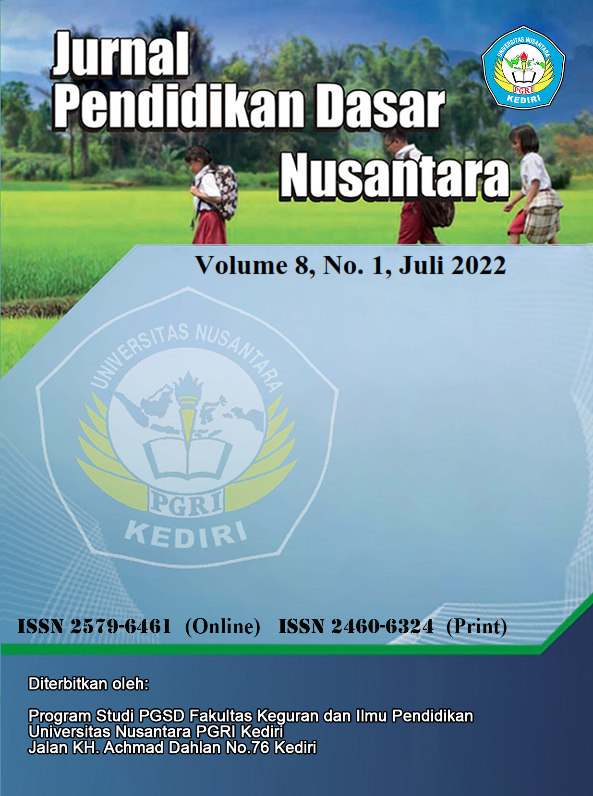THE EFFECT OF DISCOVERY LEARNING IMPLEMENTATION ON SCIENCE LITERATURE ABILITY REVIEWING FROM SELF REGULATION LEARNING ELEMENTARY SCHOOL STU-DENTS
DOI:
https://doi.org/10.29407/jpdn.v8i1.17847Keywords:
discovery learning, kemampuan literasi, self regulation learning.Abstract
Abstract: This study aims to determine the effect of Discovery Learning model on scientific literacy skills in terms of Self Regulation Learning in class V Cluster II students, Jembrana District. The research design is 2x2 factorial experimental design. The number of population members is 137 students, and number of sample members is 116 students drawn by random sampling. Science literacy ability data was collected by multiple choice test and Self Regulation Learning data was collected by questionnaire. Analysis of the data used in this study was two-way ANOVA and t-Scheffe test assisted by SPSS 17.0 for windows. The results of study showed 1) there are differences in scientific literacy skills between students who follow the Discovery Learning model and students who follow the conventional model 2) there is an interaction effect between the learning model and Self Regulation Learning 3) there are differences in scientific literacy skills between students who follow the Discovery Learning model and students who follow the conventional model of students who have high Self Regulation Learning 4) there are differences in scientific literacy skills between students who follow the Discovery Learning model and students who follow the conventional model of students who have low Self Regulation Learning.
Keywords: discovery learning, literacy skills, self-regulation learning.
Downloads
References
Anindyta, P. & Suwarjo. 2014. “Pengaruh Problem Based Learning terhadap Ket-erampilan Berpikir Kritis dan Regulasi Diri Siswa Kelas V”, Jurnal Prima Edukasia, Volume 2, Nomor 2. Tersedia pada http:// jour-nal.uny.ac.id/index.php/jpe/article/view/2720.
Ariawan, Ida Bagus Kade Mester, Nyoman Ayu Putri Letari & I Made A.D. (2022). Implementasi Model Pembelajaran CTL (Contextual Teaching and Learning) untuk Meningkatkan Hasil Belajar IPA. IRJE : Jurnal Ilmu Pendidikan, 2 (1) , 239 - 246. . https://journal.universitaspahlawan.ac.id/index.php/irje.
Dantes, N. 2017a. Desain Eksperimen dan Analisis Data. Singaraja: Undiksha Press.
--------------------. 2017b. Desain Eksperimen dan Analisis Data. Depok: Rajawali Press.
Dewi, Made Sri Astika & Nyoman Ayu Putri Lestari. (2020). E-modul Interaktif Ber-basis Proyek Terhadap Hasil Belajar Siswa. Jurnal Imiah Pendidikan dan Pembelajaran, 4 (3), 433-441. https://ejournal.undiksha.ac.id/index.php/JIPP/article/view/28035/16684.
Durajad. 2008. Model Pembelajaran Penemuan Discovery Learning.
Effendi, L. A. (2012). Pembelajaran matematika dengan model penemuan terbimbing untuk meningkatkan kemampuan representasi dan pemecahan masalah matematis siswa SMP. Jurnal Penelitian Pendidikan, 13 (2).
Kulsum, Nenden Nur Sayyidah., Endang Surahman & Mufti Ali. (2020). IMPLEMEN-TASI MODEL DISCOVERY LEARING TERHADAP LITERASI SAINS DAN HASIL BELAJAR PESERTA DIDIK PADA SUB KONSEP PENCE-MARAN LINGKUNGAN. Jurnal Biologi dan Pembelajarannya, 15 (2), 55-65.
Lestari, Nyoman Ayu Putri. (2021). Modul Pendidikan Kewarganegaraan Untuk Perguruan Tinggi. Badung: Nilacakra.
Lestari, Nyoman Ayu Putri, Made S.A.D & Isyarotullatifah. (2021). Pengaruh Imple-mentasi Problem Based Learning Terhadap Motivasi Berprestasi dan Kemampu-an Berpikir Kritis pada Pembelajaran Tematik Terpadu Kelas IV SD Gugus IV Kecamatan Mendoyo. Jurnal Pendidikan Dasar Nusantara, 6 (1), 52-70. https://doi.org/10.29407/jpdn.v6i2.14669
Marhaeni, A.A.I.N. 2012. Landasan dan Inovasi Pembelajaran. Singaraja: Undiksha.
Organization for Economic Cooperation and Development (OECD). 2019. “PISA 2018 Assessment and Analytical Framework: Science, Reading, Mathematic and Fi-nancial Literacy”. Publish in OECD iLibrary. Tersedia pada https://doi.org/10.1787/b25efab8-en.
Riva, S.d.l. & Thomas G.R. 2015. “Effect of Self-Regulating Behaviour on Young Children’s Academic Success”. International Journal of Early Childhood Special Education. Vol 7, No 1, Page 69-96. Tersedia pada http://www.int-jecse.net/article-details/2015/7/1/4
Rubini, B.D, dkk. 2016. “Identify Scientific Literacy from the Science Teacher Perspec-tive”. Indonesian Journal of Science Education. Vol 5, No 2. Tersedia pada https://journal.unnes.ac.id/artikel_nju/jpii/7689.
Sugiyono. 2008. Statistika untuk Penelitian, Cetakan Ketigabelas. Bandung: CV Alfabeta.
Susanto, A. 2014.Teori Belajar & Pembelajaran di Sekolah Dasar. Cetakan Kedua. Ja-karta: Kencana Prenamedia Group.
Utami, Wulan Aprilia, Rini Rita T. Marpaung & Berti Yolida. (2019). Pengaruh Model Discovery Learninng Terhadap Kemampuan Literasi Sains Peserta Didik. Jurnal Bioterdidik, 7(5), 77-85.
Downloads
Published
Issue
Section
License
Authors who publish with this journal agree to the following terms:
- Copyright on any article is retained by the author(s).
- The author grants the journal, the right of first publication with the work simultaneously licensed under a Creative Commons Attribution License that allows others to share the work with an acknowledgment of the work’s authorship and initial publication in this journal.
- Authors are able to enter into separate, additional contractual arrangements for the non-exclusive distribution of the journal’s published version of the work (e.g., post it to an institutional repository or publish it in a book), with an acknowledgment of its initial publication in this journal.
- Authors are permitted and encouraged to post their work online (e.g., in institutional repositories or on their website) prior to and during the submission process, as it can lead to productive exchanges, as well as earlier and greater citation of published work.
- The article and any associated published material is distributed under the Creative Commons Attribution-ShareAlike 4.0 International License

































